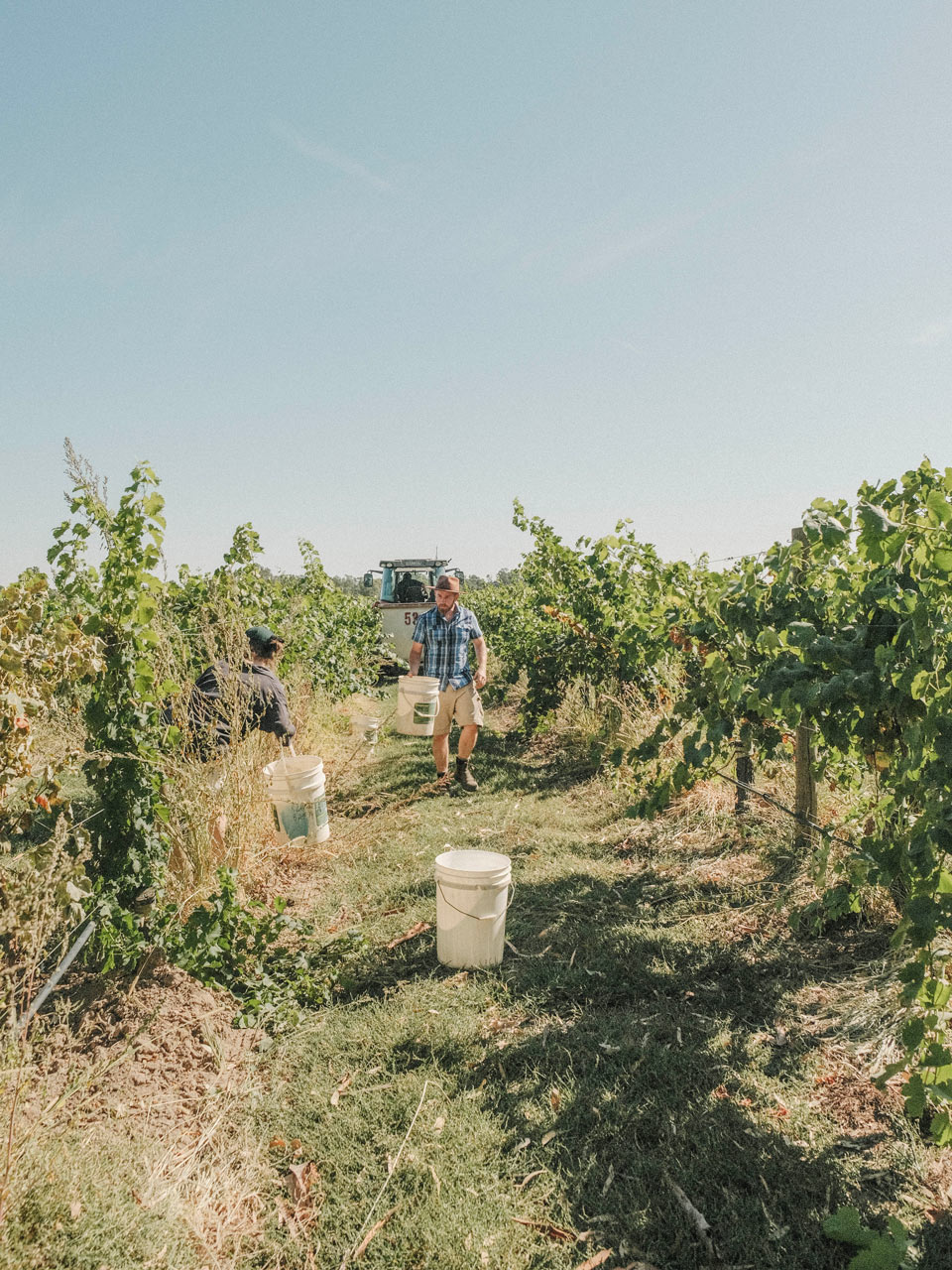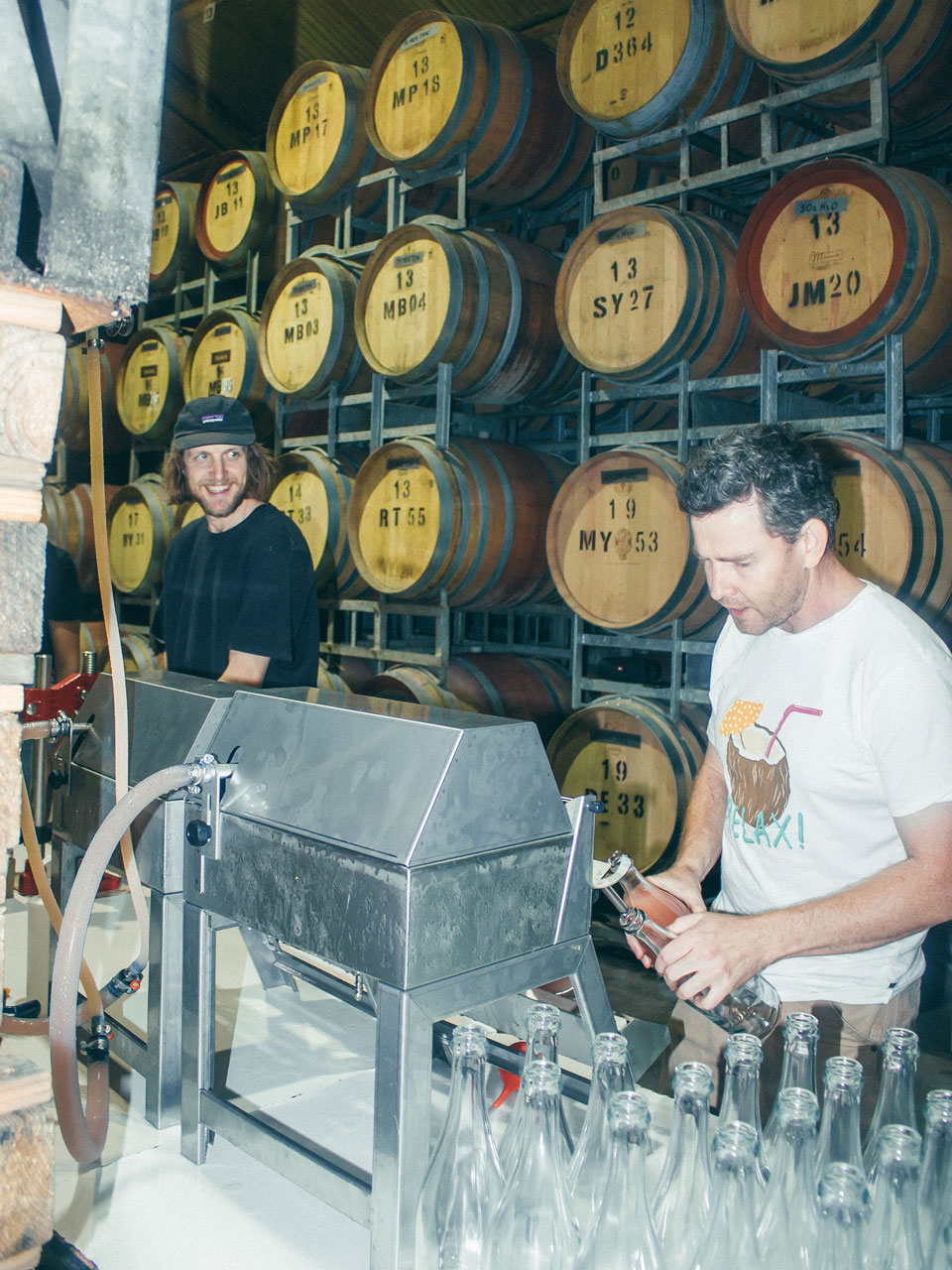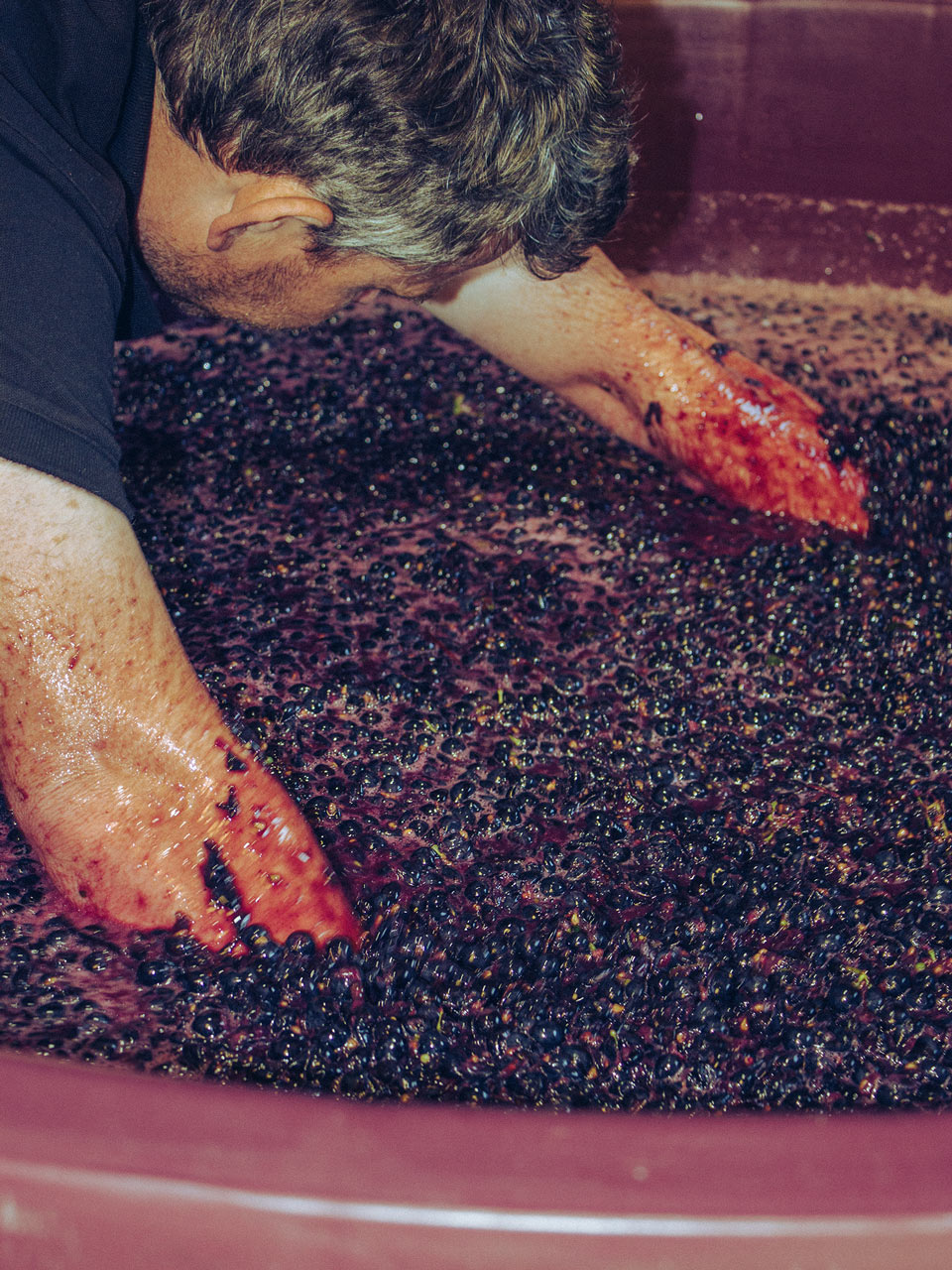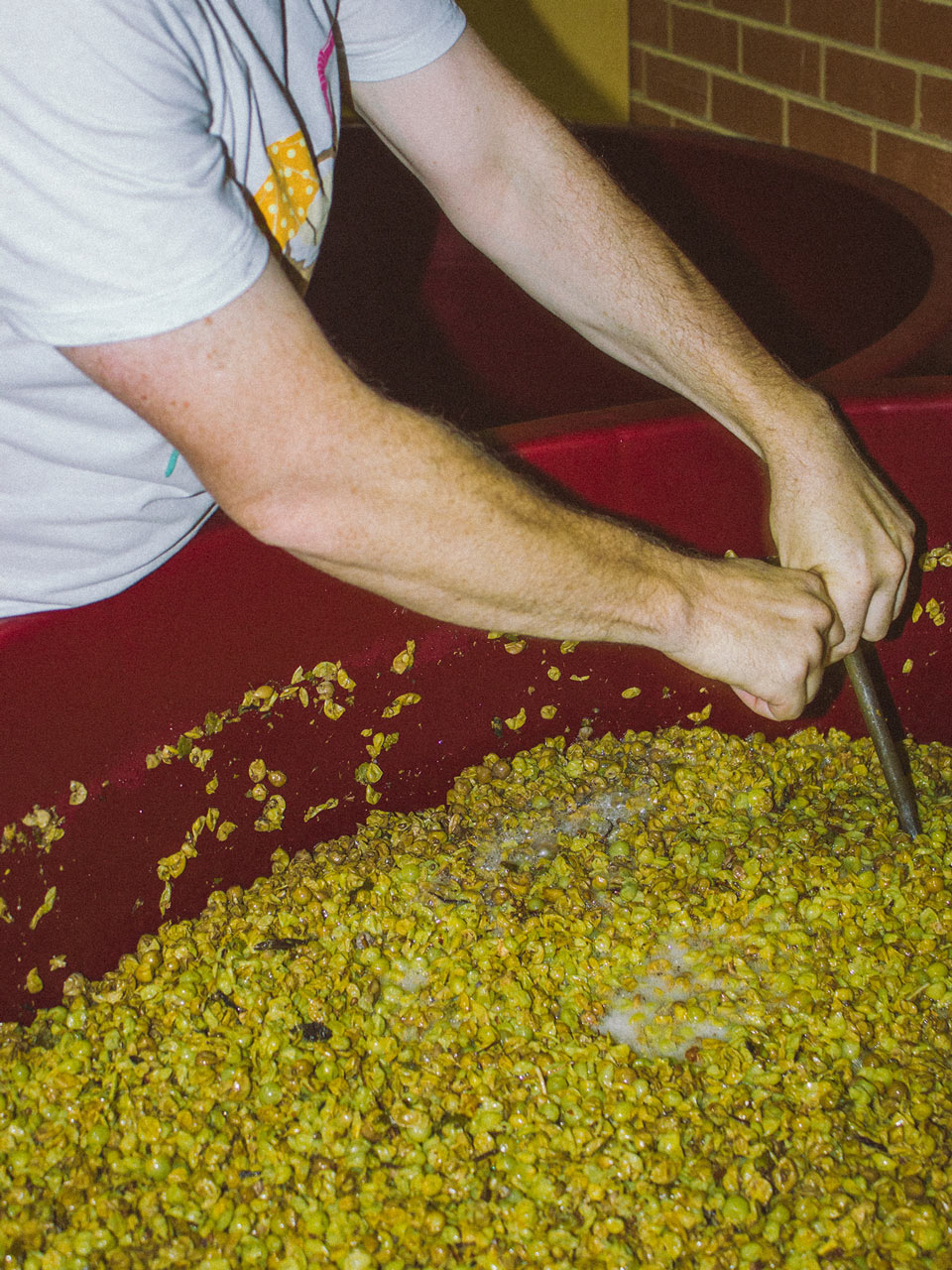Minimum Wines started as a natural extension of Matt and Lentil Purbrick’s Grown & Gathered project, which was an exploration of living off the land, growing, foraging, hunting, cooking and making. Wine was always part of the picture – and not just because Matt is a Tahbilk Purbrick – with an organic and ultra-lo-fi approach. Scaled up, the processes aren’t quite so rustic anymore, thorough still decidedly lo-fi, with a foundation of organics, sustainability – along the whole production, supply and consumption chain – and environmental and social responsibility. Wines under the Minimum banner encompass the core range of a chardonnay, blended sangiovese and syrah red, and the same varieties in rosé form, while the Short Runs range allows for more creative expression, with skinsy whites, no filtration, low-sulphur offerings and pét-nats the general theme. Today, Leigh Ritchie has joined Matt Purbrick at the winemaking helm.
“Making wine excites us,” says Purbrick. “We are abundantly energised by the task of gracefully facilitating the transformation that turns grapes into wine. But also, Minimum is neither just about wine, nor organics. For sure we want to create beautiful wines that heal the environment rather than destroy it. And we love that we can use this brand and these wines to continue to advocate for organic and natural farming and its ability to do that healing. But also, this project is about art and poetry and music. It’s about our community having a space to share ideas with each other and to share in and enjoy all the other things that come with wine.”
That holistic view has always been key for Purbrick, with the Grown & Gathered project firmly built on a community of like-minded people, collaborating, trading and sharing. That project was centred on living a ‘natural’ life, a village-based existence where creativity was expressed through growing, making and cooking. “So, right now, making wine is the creative outlet for us on many levels, a place to experiment, and it’s work that brings joy and pleasure and enriches our life,” he says, noting that they also collaborate extensively both for the label and outside it to support artists, musicians and community organisations.
Today, Matt and Lentil are based in Europe, returning each year for vintage. That necessitated an addition to the winemaking team to work with long-term team member Mat Bate. So, enter Leigh Ritchie. Purbrick and Ritchie grew up in the same region and have been friends since university, also travelling the world together.
Ritchie has worked in wine since 2006, with vintages across Australia, Israel and the Napa Valley. It’s the latter that he credits as having the most influence on his approach to winemaking, working with Nick Gislason at Screaming Eagle and Austin Peterson at Ovid across a five year period, returning home in 2019. Ritchie has also worked with Brokenwood, Mac Forbes, Best’s, Stanton & Killeen and Mitchelton.
With the family winery the iconic Tahbilk in the Nagambie Lakes region, Purbrick had a very solid grounding in vineyards, both with wine grapes and his nonno’s sultana vines in Mildura. His path to making wine was very different to his father’s, though, with a foundation in organics and a lo-fi approach in the shed. “’Doing’ wine as a part of my life just seems inevitable, and having Leigh now joining us in this project after a nearly 20-year-long friendship, has been the cherry on top,” he says.
From the start, Minimum was always going to be an organic brand (though the Goulburn Valley vineyard was in conversion when launched), with sustainability as its bedrock. Minimum is certified carbon zero through Toitū, certified organic (ACO), vegan certified and B Corp certified, which means the business meets the highest standards of social and environmental impact, with 5 per cent of revenue donated to complementary causes. Additionally, a tree is planted for every dozen bottles sold, and corks are employed instead of screw caps, and not just because they’re carbon negative.
“We are massive advocates of cork,” declares Purbrick. “We are intimate with cork forests in Italy where Lentil and I spend a lot of our time these days, and we believe wholeheartedly in that industry and its staggering array of beneficial effects on the planet. It’s not romantic for us; it’s just by far the most common sense closure that has ever existed for wine! For us, wine is a simple thing, and we aim not to complicate it.”
In 2017, they helped switch their source vineyard’s management plan. “We took it from very conventional, modern-ag management to a very natural-process-centred type of stripped back certified organic management,” says Purbrick. “In just that incredibly short period of time, we are seeing measurable increases in soil life and massive increases in natural resistance to pests and disease. The 2023 season has been a shocking year, for sure, with late ’22 floods wiping out 90 per cent of our yield, but the fruit that has come off has been a joy to work with, and even more precious than normal.”
That vineyard is also being better positioned to manage a warm climate, with more sangiovese planted and a lot of the vineyard grafted over to grenache, mourvèdre and fiano. “These all absolutely thrive in hotter climates,” notes Purbrick. “We irrigate from Gaiyala/Warring (the Goulburn), and we monitor soil moisture carefully to be as efficient as possible with that now. Our primary vineyard aims are to increase soil carbon and life, both of which massively increase water-holding capacity. So, we believe our vines will cope with the changes to come. The flavour profiles we see may change, and are changing, but we are more than happy to change with them.”
So far, those flavours have happily been getting more layered and nuanced. “Joyful, herbal, floral subtleties that didn’t manifest in the early years,” says Purbrick. “Trusting in the natural processes and just allowing things to be has revealed a whole new landscape of depth in the wines year on year. It comes back to a sense of energy and aliveness. When the vines are humming with energy, that’s when the wines have a chance at expressing something more than just ‘wine-ness’.”
On the winemaking front, Ritchie says they follow the in-house philosophy of a low-addition approach and use experimentation to create new styles, improve practices and adjust to the season. “We don’t set out to make any particular thing or control and coerce,” adds Purbrick. “The joy for us is the beautiful and mysterious dance with the ferment. The visceral experience. The connection to the grapes and honouring the life-force of the vines. We want to create wines that are alive with energy.”
Ritchie notes, in their region, they can feel like outliers in their philosophies, but that things are starting to change. “There is a wonderful group of local small producers that we align with strongly. …But there are also some absolute titans of the conventional side of the wine industry in our hood, and most are incredibly supportive of a project like ours that is trying to push these conventional boundaries.”
The climate is suited well to the red varieties, says Ritchie. “We deal with hot conditions, so our pick times are crucial to maintain some tension and energy in the fruit. For the whites, our region produces full-flavoured, textural wines. The site doesn’t lend itself to light delicate whites, so we employ a mix of wild ferment, skin contact, skin ferment, hyper-oxidation, barrel fermentation and go with full malo fermentation on most whites and all reds to encourage texture and complexity.”
The Short Runs line is the main outlet for the experimental wines, but some of those practices are bleeding across to the main range, including not filtering. “We want to do this so that all of our wines remain alive in the bottle,” explains Purbrick. “It all comes back to facilitating the transfer of energy from the vine to the end drinker. We don’t believe in a reliance on adds, so use very few, and of those very little… often none at all.”
There will no doubt be plenty more additions to the Minimum portfolio, along with the Un Po’ label that is mainly destined for the European market, but the approach will always remain the same, says Purbrick.
“We truly believe in allowing the process of winemaking to be as natural as possible, and we feel a deep connection to the old traditional, ancestral spirit of winemaking. It is a much more stressful approach, without the use of all the modern checks and balances, and there is certainly more risk of things going irrecoverably wrong, but we have a trust and belief in this process, and it has been a joy sharing and drinking the wines that have resulted from embracing that spirit of trust.”






